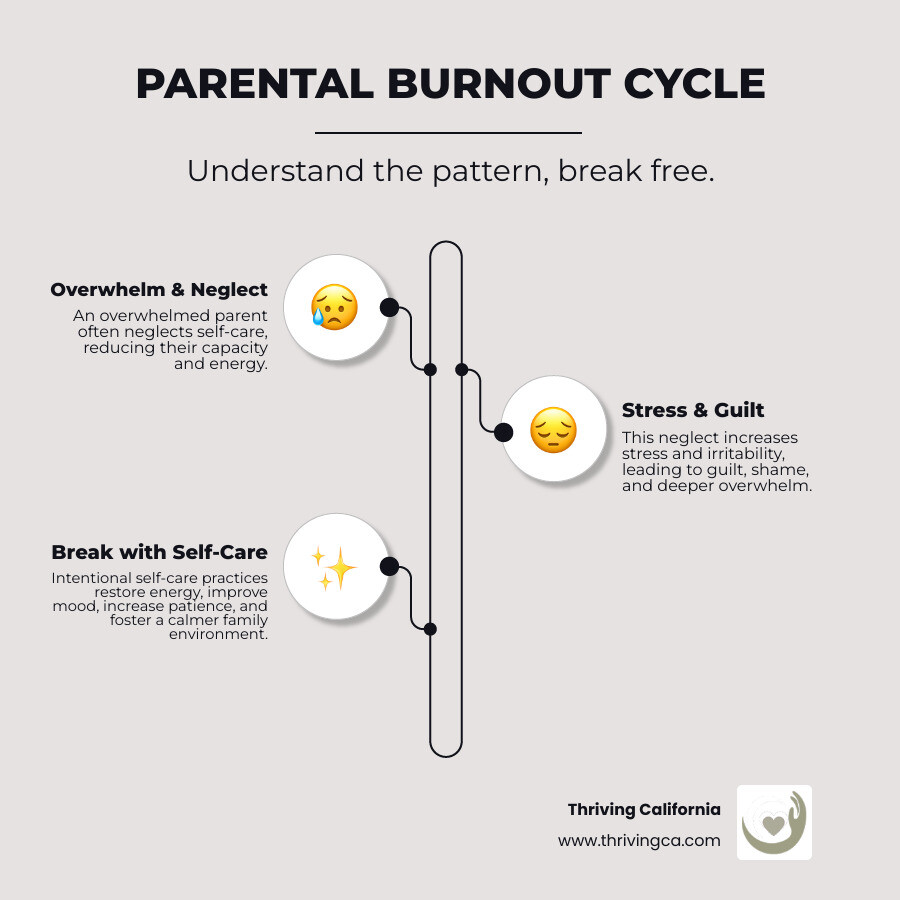Self-Care for Parents: Breaking Free from Guilt While Raising Young Children

Understanding Why Self-Care Parenting Matters for Your Family's Well-Being
Self-care parenting represents an essential practice of taking care of your physical, emotional, and mental health while managing the beautiful yet stressful demands of raising young children. This approach challenges the outdated belief that good parents must sacrifice everything for their kids and family. Rather than requiring elaborate spa retreats or expensive, time-consuming getaways, meaningful self-care integrates simple, sustainable habits into your existing daily routine and to-do list.
The importance of self-care cannot be overstated—it's about recognizing that both you and your children benefit when you practice self-care regularly. These practices might include deep breathing exercises to calm your nervous system, protecting your sleeping schedule, establishing boundaries that preserve your energy, engaging in physical movement that helps you relax, and developing the courage to build a support network. For parents in Napa, Lafayette, and Thousand Oaks areas, as well as those throughout California accessing services via telehealth, understanding the importance of self-care transforms how families function.
Many parents feel guilty when they spend time on themselves, believing that any attention directed toward their own well-being diminishes what they can offer their children. Research demonstrates the opposite truth. When parents forget to practice self-care and neglect their own needs, chronic stress increases dramatically, leading to emotional depletion, potential caregiver burnout, and disconnection from the very kids they're working so hard to nurture.
The familiar airline instruction about oxygen masks provides the perfect analogy for the importance of taking care of yourself first. You cannot sustain others when your own resources are depleted. When you practice self-care, you gain more energy, enhanced patience, presence, and joy in parenting. This replenishes the exact resources required to meet parenthood's relentless challenges with grace and resilience.
At Thriving California, our doctoral-level clinicians witness daily how essential it is to practice self-care when navigating the intense demands of raising children ages 0-3. We specialize in helping parents, particularly mothers and fathers of young children, move past guilt to develop personalized, achievable approaches that reduce anxiety, help avoid burnout, and restore family balance.
Why Self-Care Feels Hard Yet Remains Critical
Parents often default to self-neglect, instinctively channeling their best energy toward kids, partners, and work responsibilities while leaving nothing for themselves. Finding time for personal needs can feel impossible. This pattern emerges from powerful combinations of parental guilt, severe time limitations, and societal expectations demanding perfect caregiving. Gradually, parents lose connection with their identity, forget their own needs, and become consumed by their caregiving role until depletion occurs.
When personal needs consistently rank last on the to-do list, both physical and mental health pay significant prices. Chronic stress without adequate restoration triggers persistent physiological arousal. Research links this chronic activation to elevated biomarkers for heart disease, depression, inflammation, and metabolic disorders. Neglecting your well-being creates more than fatigue; it generates profound emotional exhaustion, heightened irritability, and painful disconnection from children, ultimately affecting your entire family's mental health.
Self-care for parents transcends luxury status, representing necessary investment in your family's long-term stability. Taking a break to relax isn't selfish—it's essential. Our practice in California helps parents understand this fundamental truth through evidence-based approaches tailored to each family's unique circumstances.

Defining Self-Care for Parents of Young Children
Self-care encompasses intentional well-being through deliberate actions designed to replenish energy and support both you and your mental health. This concept extends far beyond surface-level pampering to embrace comprehensive health approaches.
Physical self-care forms the foundation. This means securing adequate sleeping time despite imperfect conditions. It involves eating nourishing foods that stabilize energy rather than surviving on kids' leftovers. It includes physical exercise and movement that helps your body relax and release tension, whether walking your neighborhood, stretching during naptime, or practicing deep breathing exercises that regulate your nervous system.
Emotional self-care creates space for acknowledging and processing feelings without judgment. This might involve taking a moment to write in a journal, connecting with understanding friends who provide support, or allowing yourself to feel overwhelming emotions without shame. It means extending yourself the same compassion you naturally offer your children.
Social self-care addresses parenting's inherent isolation. This involves intentionally spending time with other adults, reminding yourself that your identity extends beyond parenting roles. Schedule regular date night conversations with your partner, weekly calls with friends, or text exchanges with those who understand your experience. These connections nurture aspects of yourself separate from parenting identities.
Mental self-care provides your brain a break from parenting's cognitive load and endless to-do list. This means engaging with stimulating or relaxing non-parenting activities that support your mental health, such as reading fiction at night before bed, enjoying podcasts during your morning routine, or completing puzzles that engage different mental pathways.
The first step involves abandoning expectations for large blocks of free time, instead integrating these healthy habits through micro-moments throughout daily life. Our clinicians at Thriving California help parents identify and implement these brief but powerful restoration opportunities.

Overcoming Common Challenges and Persistent Guilt
Many parents feel guilty when they practice self-care, experiencing intense guilt when prioritizing personal needs, believing every moment of free time spent on themselves abandons their kids. These feelings intensify without supportive partners, with financial limitations, or when childcare logistics seem insurmountable. The challenge becomes even harder for parents managing additional stressors.
Solutions begin with profound mindset shifts rooted in self-compassion. Talk to yourself with the kindness you'd extend to struggling friends. Remind yourself repeatedly that taking a break to recharge doesn't deprive children; it ensures you have more energy, greater patience, and emotional stability for them. Research consistently demonstrates that parents who practice self-care exhibit enhanced patience, improved emotional regulation, and increased parenting satisfaction. You deserve the same care you provide others.
Managing these complex emotions becomes easier with professional support. At Thriving California, our doctoral-level clinicians excel at helping parents throughout California navigate these challenges, overcome guilt patterns, and develop sustainable practices fitting their unique family dynamics.
Ten Practical Self-Care Strategies for Busy Parents
Self-care shouldn't become another stressful item on your to-do list. The goal involves weaving small, achievable habits that help you relax into existing life rhythms rather than adding pressure.
1. Establish Brief Pause Rituals
Even 5-15 minutes of intentional pausing can help manage chronic stress and regulate your nervous system. These conscious breaks involve activities promoting relaxation during stressful moments. Try deep breathing exercises while coffee brews, stepping outside briefly for sunlight, or listening to music that helps you relax. These consistent moments interrupt stress cycles, supporting your mental and physical health.
2. Protect Your Sleeping Schedule
Many parents sacrifice precious sleeping time for personal activities after kids' bedtimes. While understandable, this habit creates exhaustion cycles affecting mood and health. Create simple wind-down routines each night: dim lights, enjoy herbal tea, write briefly in a gratitude journal, and disconnect from devices 30 minutes before bed. Guard your sleeping schedule as carefully as you protect your children's rest—adequate sleep helps you avoid burnout.
3. Incorporate Physical Exercise for Mental Clarity
Full gym sessions aren't necessary for exercise benefits. Brief physical movement bursts prove equally effective and less time-consuming. Try 15-minute walks, living room dance sessions with kids, or evening stretching routines. Regular exercise releases mood-enhancing endorphins, providing more energy while improving mental clarity. Even small amounts of physical activity support both mental and physical health.
4. Reconnect with Personal Interests
Finding time for hobbies might feel hard, but reconnecting with pre-parenthood interests represents vital self-care. Start small during free time: spend 20 minutes gardening, sketching, playing instruments, or enjoying interest-related podcasts. These activities remind you of your complete identity beyond being a parent.
5. Establish Healthy Boundaries
Learning to protect your energy and say no to additional demands is crucial. It's acceptable to decline extra commitments, skip social plans when you need to relax, or establish household quiet hours. Communicate needs clearly: "Thank you, but I need to focus on my family this week." Trust your sense of what your family needs.
6. Maintain Your Support Network
Parenting can feel isolating despite family presence. Nurture connections with partners and friends who provide emotional support. Schedule regular date night conversations with your partner, weekly friend check-ins, or join parent groups (though not formal support groups). These relationships remind you that you're more than just a parent and help prevent caregiver burnout.
7. Request and Accept Help
The myth of the "super-parent" who manages everything alone leads directly to burnout. Requesting support from your network demonstrates strength and self-awareness, not weakness. Build reliable connections including family, friends, or neighbors who can watch the kids occasionally. Make specific requests: "Could you watch the baby for 30 minutes while I take a break to shower?" People often willingly help when asked directly.
8. Cultivate Gratitude and Self-Compassion
Counter negative self-talk by focusing on positives. Each night before bed, write three daily successes in a gratitude journal, however small. Practice self-compassion when mistakes occur—talk to yourself with friend-like kindness. This habit builds resilience, particularly for those managing anxiety and helps create a positive sense of accomplishment.
9. Nourish Your Body Through Mindful Eating
Parenting demands physical stamina. Your body requires proper nutrition for managing stress and maintaining energy. Surviving on caffeine alone causes energy crashes and irritability. Prioritize nutritious eating habits and stay hydrated throughout the day. Keep healthy snacks accessible and remember that taking care of your physical health directly impacts your mental well-being.
10. Create Awareness Around Digital Overwhelm
Constant digital stimulation increases mental stress and anxiety. Designate device-free moments during meals or the first hour after kids return home. This creates mental space for genuine presence with family and yourself. Being aware of screen time's impact helps you make intentional choices about when to disconnect and relax.

How Your Self-Care Benefits Both You and Your Entire Family
Committing to practice self-care creates benefits extending beyond yourself. Like pond ripples, your well-being spreads outward, generating positive household shifts that support both you and your children's development.
You model healthy habits for observant kids. Children learn more from watching what you do than listening to what you say. Witnessing you manage stress through deep breathing, prioritize rest when tired, or maintain boundaries teaches invaluable life skills. Parents who practice self-care naturally demonstrate greater patience, playful engagement capacity, and calm responsiveness. Through self-care, you break generational patterns, demonstrating that taking care of yourself and loving your family intertwine rather than compete.
Creating Connected, Peaceful Homes
Your emotional state proves contagious. When you feel centered and calm, your children's nervous systems co-regulate, increasing their sense of security. This emotional safety atmosphere helps the whole family relax and thrive. Homes acknowledging each member's needs become training grounds for empathy. Kids learn that self-care represents responsible health maintenance rather than selfishness. This mutual respect strengthens bonds while reducing family conflict.
Building Your Child's Future Foundation
Self-care's most profound gift involves teaching children their inherent worth through your example. Modeling these healthy habits demonstrates emotional regulation while normalizing mental health awareness from early ages. Children absorb that having needs, feeling emotions, and seeking support when life feels hard are acceptable and normal. This builds secure attachment, foundational for all future relationships. Remember: practicing self-care doesn't take away from kids—it provides emotional blueprints and practical tools for lifelong thriving.

Recognizing and Addressing Parental Burnout
Parental burnout exceeds typical tiredness or everyday stress. It represents complete emotional, mental, and physical exhaustion from chronic, unmanaged parenting demands. This serious condition occurs when daily challenges consistently exceed your ability to cope, leaving you feeling depleted with no energy reserves.
Burnout indicators that parents feel include:
- Overwhelming exhaustion persisting despite sleeping or rest
- Emotional detachment from children, with parenting feeling mechanical
- Increased irritability over minor frustrations throughout the week
- Persistent sense of failing as a parent regardless of effort
- Physical symptoms including chronic fatigue, disrupted sleep patterns, frequent headaches, or illness
Acknowledging these experiences without judgment becomes the first step toward recovery. Burnout results from chronic stress combined with insufficient resources and support. During burnout, self-care seems impossible yet becomes most critical for managing symptoms and recovery.
Prevention and Management Strategies
Burnout remains preventable and manageable through intentional action:
- Develop awareness of early warning signs: Notice persistent fatigue, increasing irritability, or growing sense of dread about parenting duties
- Visit with professional support: Therapy provides confidential space and evidence-based strategies for managing stress and preventing caregiver burnout
- Partner communication: Approach challenges together, scheduling weekly check-ins about stress levels and mutual support planning
- Adjust expectations: Release perfectionist parenting myths. Children need a present, loving, good-enough parent rather than a perfect, exhausted one
At Thriving California, our doctoral-level clinicians provide compassionate, evidence-based services building burnout resilience while fostering family connection. We help parents develop sustainable strategies that work for their specific situation.
Common Questions About Self-Care for Parents
How can I practice self-care without time or money?
Finding time feels hard, but redefine self-care beyond expensive, time-consuming activities. Focus on free micro-moments that help you relax: conscious deep breathing exercises before leaving cars, brief stretches, stepping outside during naps, enjoying single songs while completing chores, or taking a moment to write gratitudes on sticky notes. Self-care concerns intention, not expense or duration.
Isn't self-focus selfish when kids need me?
The importance of self-care extends to your entire family. Remember oxygen mask principles: empty reserves prevent effective caregiving. Parents who practice self-care have more energy, demonstrate enhanced patience, presence, and joy. You're modeling that personal needs matter—teaching children healthy habits for their future resilience. Taking care of yourself helps you become a better parent.
What if my partner doesn't support my self-care needs?
Begin with open conversation: "I feel overwhelmed and need time to recharge so I can be a better parent and partner." Frame self-care as family investment benefiting everyone. Suggest equitable systems providing both partners predictable free time each week, perhaps alternating who takes a break while the other watches the kids. Schedule a regular date night for connection. When conversations remain unproductive, professional support helps couples develop collaborative family strategies.
Beginning Your Self-Care Journey Today
Self-care for parents represents ongoing practice rather than destination. This continuous journey involves small, intentional choices that gradually become healthy habits. Start modestly, prioritize consistency over perfection, and maintain self-compassion throughout. When you practice self-care and prioritize well-being, you model emotional regulation, healthy boundaries, and self-respect for children. You teach that taking care of yourself provides family love's foundation. Your calm becomes their calm; your resilience becomes theirs.
At Thriving California, we understand parenthood's isolating, overwhelming nature, especially when chronic stress makes everything feel hard. Our dedicated doctoral-level clinicians specialize in supporting parents through pregnancy anxiety, new parenting adjustments, relationship challenges, and birth trauma processing. We offer personalized, evidence-based therapy services helping build confidence, skills, and clarity for thriving rather than merely surviving each week.
Investing in your mental and emotional health provides profound, lasting gifts to children. When parents feel seen, heard, and supported, families flourish. If you're ready to transition from depletion to replenishment and avoid burnout, we invite your next step.
Seeking support demonstrates strength and commitment to becoming the best version of yourself as a parent. Contact Thriving California today for a free 20-minute consultation to discuss how our specialized therapy can support your journey toward balanced, joyful, sustainable parenting. Together, we'll help you build the self-care foundation both you and your family deserve.
